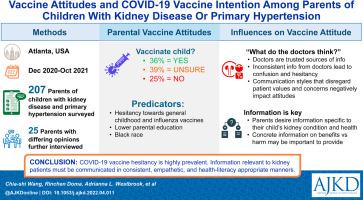American Journal of Kidney Diseases ( IF 9.4 ) Pub Date : 2022-06-21 , DOI: 10.1053/j.ajkd.2022.04.011 Chia-Shi Wang 1 , Rinchen Doma 2 , Adrianna L Westbrook 1 , Jillian Johnson 2 , Evan J Anderson 1 , Larry A Greenbaum 1 , Shaheen A Rana 3 , Roshan P George 1 , Rouba Garro 1 , Anjali Khanna-Farber 1 , Cam Escoffery 2 , Robert A Bednarczyk 4

|
Rationale & Objective
Children with kidney disease and primary hypertension may be more vulnerable to COVID-19. We examined COVID-19 vaccine hesitancy among parents of children with chronic kidney disease or hypertension.
Study Design
Sequential explanatory mixed-methods design; survey followed by in-depth interviews.
Setting & Participants
Parents of children aged <18 years with kidney disease or primary hypertension within a large pediatric practice.
Exposure
Parental attitudes toward general childhood and influenza vaccines assessed by the Vaccine Hesitancy Scale. Kidney disease classification, demographic and socioeconomic factors, experiences with COVID-19, COVID-19 mitigation activities and self-efficacy, and sources of vaccine information.
Outcome
Willingness to vaccinate child against COVID-19.
Analytical Approach
Analysis of variance (ANOVA) test to compare parental attitudes toward general childhood and influenza vaccination with attitudes toward COVID-19 vaccination. Multinomial logistic regression to assess predictors of willingness to vaccinate against COVID-19. Thematic analysis of interview data to characterize influences on parental attitudes.
Results
Of the participants, 207 parents completed the survey (39% of approached): 75 (36%) were willing, 80 (39%) unsure, and 52 (25%) unwilling to vaccinate their child against COVID-19. Hesitancy toward general childhood and influenza vaccines was highest among the unwilling group (P < 0.001). More highly educated parents more likely to be willing to vaccinate their children, while Black race was associated with being more likely to be unwilling. Rushed COVID-19 vaccine development as well as fear of serious and unknown long-term side effects were themes that differed across the parental groups that were willing, unsure, or unwilling to vaccinate their children. Although doctors and health care teams are trusted sources of vaccine information, perceptions of benefit versus harm and experiences with doctors differed among these 3 groups. The need for additional information on COVID-19 vaccines was greatest among those unwilling or unsure about vaccinating.
Limitations
Generalizability may be limited.
Conclusions
Two-thirds of parents of children with kidney disease or hypertension were unsure or unwilling to vaccinate their child against COVID-19. Higher hesitancy toward routine childhood and influenza vaccination was associated with hesitancy toward COVID-19 vaccines. Enhanced communication of vaccine information relevant to kidney patients in an accessible manner should be examined as a means to reduce vaccine hesitancy.
Plain-Language Summary
Children with kidney disease or hypertension may do worse with COVID-19. As there are now effective vaccines to protect children from COVID-19, we wanted to find out what parents think about COVID-19 vaccines and what influences their attitudes. We surveyed and then interviewed parents of children who had received a kidney transplant, were receiving maintenance dialysis, had chronic kidney disease, or had hypertension. We found that two-thirds of parents were hesitant to vaccinate their children. Their reasons varied, but the key issues included the need for information pertinent to their child and a consistent message from doctors and other health care providers. These findings may inform an effective vaccine campaign to protect children with kidney disease and hypertension.
中文翻译:

肾病或原发性高血压儿童家长对疫苗的态度和 COVID-19 疫苗意愿
理由和目标
患有肾脏疾病和原发性高血压的儿童可能更容易感染 COVID-19。我们调查了患有慢性肾病或高血压的儿童的父母对 COVID-19 疫苗的犹豫情况。
学习规划
序贯解释性混合方法设计;调查后进行深度访谈。
背景及参与者
大型儿科诊所内患有肾脏疾病或原发性高血压的 18 岁以下儿童的父母。
接触
通过疫苗犹豫量表评估父母对一般儿童和流感疫苗的态度。肾脏疾病分类、人口和社会经济因素、COVID-19 经验、COVID-19 缓解活动和自我效能以及疫苗信息来源。
结果
愿意为儿童接种 COVID-19 疫苗。
分析法
方差分析 (ANOVA) 测试,用于比较父母对一般儿童期和流感疫苗接种的态度与对 COVID-19 疫苗接种的态度。用于评估接种 COVID-19 疫苗意愿的预测因子的多项 Logistic 回归。对访谈数据进行主题分析,以表征对父母态度的影响。
结果
在参与者中,有 207 名家长完成了调查(占受访者的 39%):75 名家长(36%)愿意,80 名家长(39%)不确定,52 名家长(25%)不愿意为孩子接种 COVID-19 疫苗。在不愿意接种的群体中,对普通儿童疫苗和流感疫苗的犹豫程度最高( P < 0.001)。受教育程度越高的父母更有可能愿意为孩子接种疫苗,而黑人种族则更有可能不愿意为孩子接种疫苗。 COVID-19 疫苗的快速开发以及对严重和未知的长期副作用的恐惧是愿意、不确定或不愿意为孩子接种疫苗的家长群体的不同主题。尽管医生和医疗团队是疫苗信息的可信来源,但这三组人对益处与危害的看法以及医生的经历有所不同。那些不愿意或不确定接种疫苗的人最需要有关 COVID-19 疫苗的更多信息。
局限性
普遍性可能有限。
结论
三分之二患有肾病或高血压的儿童的父母不确定或不愿意为孩子接种 COVID-19 疫苗。对常规儿童期疫苗接种和流感疫苗接种的更大犹豫与对 COVID-19 疫苗的犹豫相关。应研究以易于理解的方式加强与肾病患者相关的疫苗信息沟通,作为减少疫苗犹豫的一种手段。
简单语言摘要
患有肾病或高血压的儿童感染 COVID-19 后情况可能会更糟。由于现在有有效的疫苗可以保护儿童免受 COVID-19 感染,我们想了解家长对 COVID-19 疫苗的看法以及影响他们态度的因素。我们对接受肾移植、接受维持性透析、患有慢性肾病或患有高血压的儿童的父母进行了调查和采访。我们发现三分之二的父母对于是否给孩子接种疫苗犹豫不决。他们的理由各不相同,但关键问题包括需要与孩子相关的信息以及医生和其他医疗保健提供者提供的一致信息。这些发现可能为有效的疫苗接种活动提供信息,以保护患有肾病和高血压的儿童。











































 京公网安备 11010802027423号
京公网安备 11010802027423号